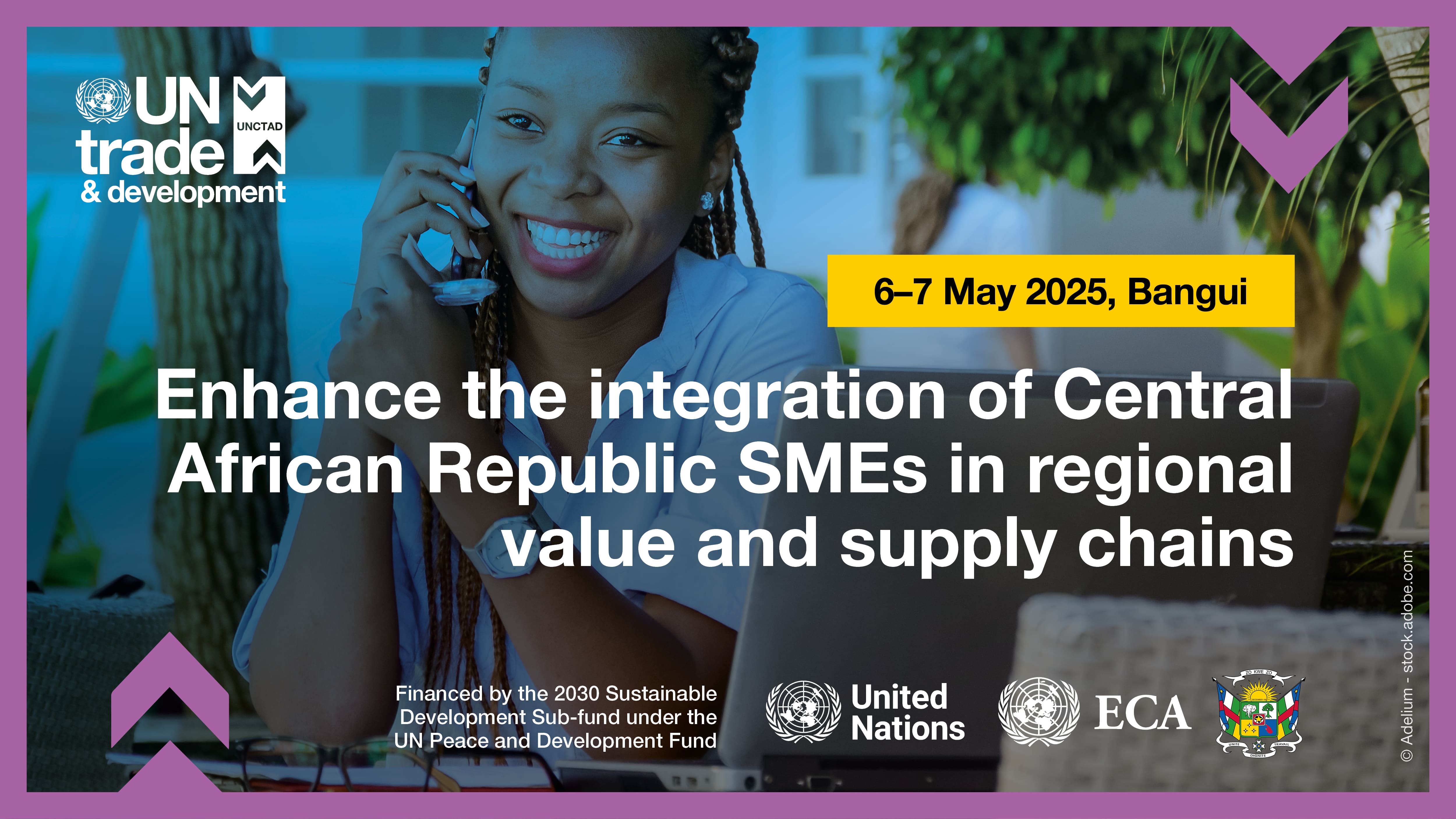In collaboration with the Ministry of Trade and Industry of the Central African Republic, the United Nations Economic Commission for Africa’s Sub-Regional Office for Central Africa (ECA) and the UN Resident Coordinator’s Office, UN Trade and Development (UNCTAD) organized a national validation workshop in Bangui, on 6 and 7 May 2025.
Held in the framework of the UNCTAD project, “Enhancing the capacity of African vulnerable countries in adopting policy incentives and innovative instruments for the participation of small and medium-sized enterprises in regional value chains”, the workshop aimed to present, review, and validate the findings of a joint UNCTAD–ECA study on the participation of Central African Republic SMEs in regional value chains under the African Continental Free Trade Area (AfCFTA).
The study highlights that over 80% of the Central African Republic’s exports are currently directed to non-African markets, with only 14% going to the continent. Revealing a missed opportunity that points out the need to accelerate regional integration and especially the AfCFTA. Moreover, exports are heavily concentrated around four products—gold, raw timber, diamonds and sawn wood—which together account for 43.2% of total exports. Despite having strong comparative advantage in sectors such as coffee, cotton, wood, and diamonds, these products remain marginal in actual export volumes of the country.
The study also emphasized that the Central African Republic could significantly increase its intra-African trade by targeting high-potential sectors like processed wood, textiles, agro-processing and semi-finished metals, particularly in growing regional markets such as Egypt, Morocco, and Kenya.
The workshop convened 55 participants representing government institutions, the private sector, and development partners. Discussions focused on the opportunities, challenges and policy recommendations needed to enhance the competitiveness of SMEs and support their effective integration into regional markets.
Throughout the workshop, participants worked in thematic groups and plenary discussions to refine the findings of the study and propose strategic recommendations. Among the priorities identified was the need to strengthen the capacity of SMEs, especially women and youth-led enterprises, on topics such as digitalization, entrepreneurship, access to finance, and market development. Participants also recommended the operationalization of existing public support structures, including national guarantee funds, to address structural gaps in SME financing and competitiveness. The workshop further highlighted the importance of creating sector-specific databases to improve market intelligence, harmonizing public and private interventions and including SMEs in the design of public policies and development programs.
The findings of the study and the stakeholders’ contributions will guide the finalization of the national report and inform future activities including technical assistance and training programmes to support policymakers and small businesses.
Regional integration and the African Continental Free Trade Area (AfCFTA) offer new prospects for trade and industrial diversification, but more targeted policies are needed to unlock the potential of Central African Republic’s Small and Medium-sized Enterprises (SMEs). Their integration into Regional Value Chains (RVCs) remains limited due to challenges, such as limited access to (i) productive resources (roads, energy, ICT); (ii) lack of skilled labor, production equipment, market information, and financing; (iii) supply-side constraints, particularly weak and unstable production capacity; and (iv) ineffective SME support policies that lack coordination and impact.
To contribute to efforts to tackle these issues, UNCTAD is implementing a project to strengthen SME participation in RVCs, in collaboration with ECA Subregional Office for Central Africa and the Ministry of Trade and Industry of the Central African Republic, by providing policy tools, institutional support and data-driven insights. In CAR, the initiative focuses on sectors such as agro-processing, wood and timber and mining (including gold and diamonds).
The national validation workshop will serve as a platform to present and refine the findings of a national study conducted under this project. It aims to validate sectoral recommendations and foster alignment with national strategies, while encouraging dialogues between government actors, the private sector and development partners.
The workshop will bring together around 50 stakeholders and will cover thematic discussions, presentation of findings and policy options to accelerate SME integration into RVCs within the AfCFTA framework. Participation is by invitation only.


